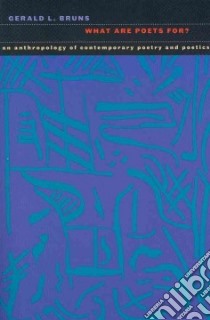What Are Poets For? - 9781609380809
Un libro in lingua di Bruns Gerald L. edito da Univ of Iowa Pr, 2012
- € 37.40
- Il prezzo è variabile in funzione del cambio della valuta d’origine
Conceptions and practices of poetry change not only from time to time and from place to place but also from poet to poet. This has never been more the case than in recent years. Gerald Bruns's magisterial What Are Poets For? explores typographical experiments that distribute letters randomly across a printed page, sound tracks made of vocal and buccal noises, and holographic poems that recompose themselves as one travels through their digital space. Bruns surveys one-word poems, found texts, and book-length assemblies of disconnected phrases; he even includes descriptions of poems that no one could possibly write, but which are no less interesting (or no less poetic) for all of that. The purpose of the book is to illuminate this strange poetic landscape, spotlighting and describing such oddities as they appear, anomalies that most contemporary poetry criticism ignores.
Informazioni bibliografiche
- Titolo del Libro in lingua: What Are Poets For?
- Sottotitolo: An Anthropology of Contemporary Poetry and Poetics
- Lingua: English
- Autore: Bruns Gerald L.
- Editore: Univ of Iowa Pr
- Collana: Univ of Iowa Pr (Paperback)
- Data di Pubblicazione: 01 Giugno '12
- Genere: LITERARY CRITICISM
- Argomenti : American poetry 21st century History and criticism Poetics
- Pagine: 222
- Dimensioni mm: 228 x 152 x 0
- ISBN-10: 1609380800
- EAN-13: 9781609380809


